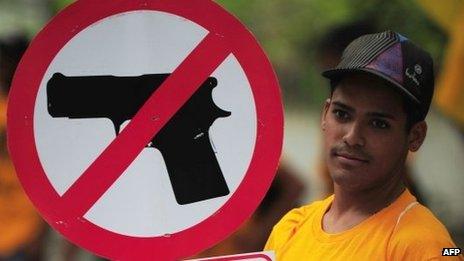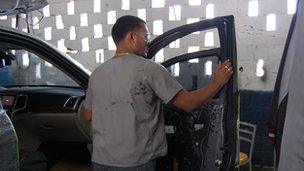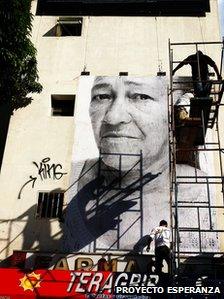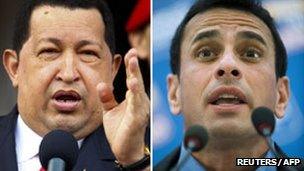Venezuela election: Violence set to be key issue
- Published

Venezuelan voters want more to be done to tackle high levels of crime
Rising violent crime in Venezuela is set to be a key issue as campaigning officially begins for October's presidential election.
In his family's apartment in a middle-class neighbourhood of Caracas one recent lunchtime, Juan Carlos, a young professional, told me about his experience of being kidnapped.
He was driving his girlfriend home one Sunday evening when another car blocked his way and two men with guns took him hostage along with his car.
"They said I was their guarantee until they could get away with my car," he said. "They even told me it was an order. They were ordered to get an SUV like the one I had."
His ordeal lasted a few hours while the gang drove to the outskirts of the city.

The owners of this car workshop say more and more customers want their cars armoured
"They told me that if I behaved everything was going to be OK and they said they were going to let me go to a taxi rank so I could get a cab."
Juan Carlos, who did not want to give his full name, was left shaken but unharmed by his ordeal.
This type of kidnapping is essentially an elaborate robbery, but it has become increasingly common in recent years.
"Ten years ago you didn't hear this very often," Juan Carlos said.
"Nowadays it could happen to anybody - a neighbour, a family member - it actually has happened to more than 10 of my friends."
Urban phenomenon
The Venezuelan Violence Observatory (OVV) says that kidnappings increased from 41 in 1999 to 589 in 2009.
It now estimates that there are more than 1,000 cases every year.

Images of victims are being used to raise awareness of violence
Abductions originally happened mainly along the country's border with Colombia - a tactic used by or borrowed from Colombian Farc rebels and paramilitary groups to kidnap wealthy ranch owners for large sums of money.
Now kidnapping has become an urban crime.
"In nine out of 10 cases it's what we call an express kidnapping," says lawyer Fermin Marmol, a criminologist who has negotiated the release of hostages in several kidnap cases.
"They choose the victim based on the vehicle they are driving and the zone they're in. They're looking to cut off the car along an isolated road."
Some victims are held for a few hours while their family is forced to hastily come up with the ransom.
Others are taken back to their homes where the robbers steal all their possessions.
Mr Marmol says few report these incidents to the police, for fear of reprisals.
Poor under fire
Kidnapping clearly targets wealthy victims. If it were the only kind of crime on the increase, it might not matter too much to the re-election chances of President Hugo Chavez, whose traditional and continued support base is among the poorer sectors of society.
There has been a similar increase, however, in other offences.
According to the OVV, the number of murders in Venezuela in 2011 topped 19,000, more than double the total 10 years previously.

Both candidates have promised to boost security
Street crime and gang violence plague the poorer neighbourhoods of Venezuela's cities, making everyone a potential victim.
Maria Elena Delgado, 57, is a perfect example.
She has lived all her life in Petare, a vast suburb of ramshackle houses built on a steep hillside overlooking Caracas.
In that time she has seen her son, daughter and grandson killed just metres from her house, caught in the crossfire of shoot-outs between rival gangs.
"When they killed my first son, it was very hard but I managed to get up and keep going," she says.
"But then when my 12-year-old daughter was killed, I didn't want to get up or go out."
'Not just statistics'
Ms Delgado has joined more than 50 other women to take part in Proyecto Esperanza, a project to raise awareness of violence and its consequences.
Her image, along with those of some of the other women, appeared on billboard-sized posters at sites all over Caracas.
"Our relatives who've been victims of violence appear as statistics. So we have to demonstrate that they exist, they're not just numbers, they were people," she explains.
The politicians have taken note. President Chavez recently launched an initiative known as a "mission" to improve security.
It will see new tribunals created at a more local level, the creation of a compensation fund for victims of crime and modernisation of prisons.
Presidential challenger Henrique Capriles has his own security plan as part of his election manifesto.
It includes increasing access to education, reducing corruption in the police and judicial systems and improving the country's prisons.
Government supporters have been quick to point out that violence has always been an issue in Venezuela and that President Chavez inherited the problem when he came into office in 1999.
The statistics show that the problem has increased since then. Although President Chavez remains ahead in opinion polls, the political opposition sees an opportunity to gain some ground on this issue.
The victims of violence in Venezuela will be hoping that whoever wins the election in October follows through on their plans to improve security.
- Published12 June 2012
- Published3 October 2012
- Published18 February 2013
- Published1 June 2012